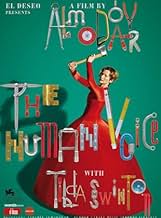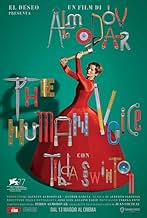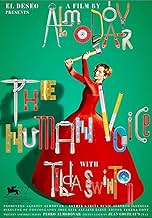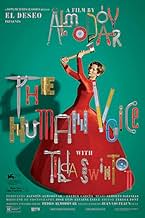PUNTUACIÓN EN IMDb
6,8/10
9,7 mil
TU PUNTUACIÓN
Añade un argumento en tu idiomaA woman watches time passing next to the suitcases of her ex-lover (who is supposed to come pick them up, but never arrives) and a restless dog who doesn't understand that his master has aba... Leer todoA woman watches time passing next to the suitcases of her ex-lover (who is supposed to come pick them up, but never arrives) and a restless dog who doesn't understand that his master has abandoned him. Two living beings facing abandonment.A woman watches time passing next to the suitcases of her ex-lover (who is supposed to come pick them up, but never arrives) and a restless dog who doesn't understand that his master has abandoned him. Two living beings facing abandonment.
- Dirección
- Guión
- Reparto principal
Reseñas destacadas
One thing I noticed, and adored, about Almodóvar, is that despite his unequivocal propensity for incorporating comedy with melodrama, there's no way his films could come across as either silly or overly sentimental. For his stories are laced with considerable nuance. His Women on the Verge on a Nervous Breakdown, which is also based on Jean Cocteau's play, "La voix humaine" as this short is, maintains an incremental humorous tone so much so it could be adequately described, by its end, as a farce. Yet, as we see Pepa trying to figure out why her lover dumped her without an explanation, Almodóvar delves into Pepa's psyche with great subtlety that's apt for her precarious state. That's why I thought The Human Voice would benefit greatly from the concentrated nature of short films. Our unnamed protagonist's wait for three days for her lover to come in a last chance to see him has filled her with rage. A vindictive rage almost identical to that of The Bride in Kill Bill, but she still loves him. So she acts out like a maniac: stabbing one of her lover's suits with an axe in a harmless cathartic release. She wouldn't dare to actually hurt him; she still loves him. Therefore, she's so vulnerable. Over the course of her conversation with his lover, her seemingly stable and wry demeanour gradually crumbles, exposing both her helplessness and her futile undirected rage. Almodóvar brilliantly highlights such contradiction and lays her feelings bare by showing the soundstage her exuberantly furnished, sumptuously coloured apartment is constructed upon. As she grows more desperate, she begins to lose control. Finally, she decides to free herself from the submissive woman she's always been, and put an end to their toxic relationship - after all, her love made her too fragile and delicate to venture to turn the tables on him as Alma did on Reynolds in Phantom Thread. The thing is, I didn't feel that she loves him. What's baffling is that I can't put my finger on why exactly I feel so, but it's likely due to the stagy feel this film has. It is a showcase of Tilda Swinton's thespian prowess, but, at times, her monologue comes off rather like a soliloquy - like there's no one on the other side of the phone line. Regardless, The Human Voice is an eye-popping, exquisitely-made feminist work with witty sarcastic undertones.
Jean Cocteau's play La Voix Humaine (The Human Voice) opened at the Comédie Française in 1930 as a atar vehicle for Belgian actress Berthe Bovy, then popular in Parisian stages. The work involves a woman, only identified as Elle = She, speaking on the telephone with his lover of several years, who is leaving her.for another woman. Her interlocutor is silent for the duration and we don't even know for sure if he is listening or if the connection has been broken.
The play had an enduring popularity, and has been since in the repertory of many theater companies. It was put on screen several times, among them by Roberto Rossellini (first episode of L'Amore 1946: actress Anna Magnani) and by Ted Kotcheff (1966: actress Ingrid Bergman). It even had a second life as an opera by Francis Poulenc in 1958, which has been as well accepted as the play and is still being staged and recorded.
This being the Almodóvar version, we may expect some off the wall happenings. One is a very funny scene where the protagonist browses for axes in a hardware store that seems to have an unusually large inventory of the item. On another, the axe in question is used in a hilarious way. We are shown mid-movie that She's apartment is actually a set in a sound stage which is perhaps a gentle dig at he artificiality of the play. And, last but not least, we have the director's trademark, cinematography in gloriously saturated colors. Tilda Swinton does an outstanding job as She; she tones down the melodrama and borders on the humorous at times. All in all, a refreshing take on the play and the best version I have seen.
The play had an enduring popularity, and has been since in the repertory of many theater companies. It was put on screen several times, among them by Roberto Rossellini (first episode of L'Amore 1946: actress Anna Magnani) and by Ted Kotcheff (1966: actress Ingrid Bergman). It even had a second life as an opera by Francis Poulenc in 1958, which has been as well accepted as the play and is still being staged and recorded.
This being the Almodóvar version, we may expect some off the wall happenings. One is a very funny scene where the protagonist browses for axes in a hardware store that seems to have an unusually large inventory of the item. On another, the axe in question is used in a hilarious way. We are shown mid-movie that She's apartment is actually a set in a sound stage which is perhaps a gentle dig at he artificiality of the play. And, last but not least, we have the director's trademark, cinematography in gloriously saturated colors. Tilda Swinton does an outstanding job as She; she tones down the melodrama and borders on the humorous at times. All in all, a refreshing take on the play and the best version I have seen.
When long ago I saw Rossellini's version of this play by Cocteau with an audience of students the most memorable moment came when Anna Magnani finally put down the phone, promptly picked it up and started dialling again and everyone in the cinema groaned en masse.
The play has yet to be filmed in French, in Pedro Almodovar's first film in English this time it has brevity on it's side and it's Tilda Swinton's turn to be the woman on the verge of a nervous breakdown.
The original was in black & white but in true Almodovar style Swinton uses an earphone that makes the proceedings seem more like an interior monologue as she prowls about cigarette in hand dressed in chic little outfits in bright pastel colours complemented by the decor and even the pills that she pops.
The play has yet to be filmed in French, in Pedro Almodovar's first film in English this time it has brevity on it's side and it's Tilda Swinton's turn to be the woman on the verge of a nervous breakdown.
The original was in black & white but in true Almodovar style Swinton uses an earphone that makes the proceedings seem more like an interior monologue as she prowls about cigarette in hand dressed in chic little outfits in bright pastel colours complemented by the decor and even the pills that she pops.
'The Human Voice (2020)' is a short film based around Jean Cocteau's play of the same name. It's directed by Pedro Almodóvar (his English-language debut) and stars Tilda Swinton as pretty much the only on-screen character (there are some background extras towards the start, but that's about it). It's a very pared-down affair, not just within its story but also within its presentation. Though it's colourful and sometimes lavish, it doesn't have the same, shall I say, 'high-calibre melodrama' feel that much of the famous director's work has. Instead, it draws as much attention to its focal performance as possible, the film taking a backseat to its subject. This isn't necessarily a bad thing, even if it runs the risk of making the flick's central monologue become a little monotonous, as it draws attention to the main reason the thing exists in the first place. In many ways, the short feels purely like a vehicle for Swinton to flex her acting muscles. The actual story isn't all that impactful and it's only as interesting as it is (it never gets boring) because it's performed so utterly well. Ultimately, however, the flick comes across as a little hollow. It's entertaining enough for what it is, but it doesn't have much staying power and it isn't actually all that compelling. It isn't bad, don't get me wrong. It's just a very, I suppose, 'in-one-ear-and-out-the-other' kind of thing. Still, it's worth a watch if you're a fan of its director, star or source material (which, incidentally, bears some similarities with 'Women On The Verge Of A Nervous Breakdown (1988)', since Almodóvar has been inspired by Cocteau's work for quite some time). 6/10.
Pedro Almodovar's short is, as the credits state - "freely adapted" from a Jean Cocteau stage production. Almodovar retains the central conceit of the play as it essentially is a monologue with a woman on a telephone talking with a lover (the other voice is never heard). Almodovar includes a brief prologue and he winks at the viewer by 'revealing' the artificiality of his own production. He also revels in his usual saturated color schemes.
Fortunately, the woman is played by Tilda Swinton who has to carry the full half hour alone. Almodovar wisely has shaped the material (for the first time in English) around Swinton's talents and she carries it off for the most part, even if some of the eccentricities the Writer-Director don't really work.
Fortunately, the woman is played by Tilda Swinton who has to carry the full half hour alone. Almodovar wisely has shaped the material (for the first time in English) around Swinton's talents and she carries it off for the most part, even if some of the eccentricities the Writer-Director don't really work.
¿Sabías que...?
- CuriosidadesThis is Pedro Almodóvar's first film in English.
- ConexionesFeatured in Projector @ LFF: One Night in Miami/The Human Voice (2020)
Selecciones populares
Inicia sesión para calificar y añadir a tu lista para recibir recomendaciones personalizadas
Detalles
Taquilla
- Recaudación en todo el mundo
- 164.623 US$
- Duración30 minutos
- Color
- Mezcla de sonido
- Relación de aspecto
- 1.85 : 1
Contribuir a esta página
Sugerir un cambio o añadir el contenido que falta

![Ver Tráiler [OV]](https://m.media-amazon.com/images/M/MV5BYzQyNTRjNDMtMDU3MS00M2M2LWIwMDQtYThjNTllZmE2ZWQ2XkEyXkFqcGdeQXRyYW5zY29kZS13b3JrZmxvdw@@._V1_QL75_UX500_CR0)























